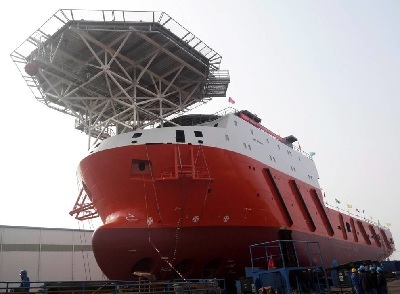 "We are glad our shipyard and subsea services have remained profitable in the last few quarters. We are cautiously hopeful that earnings from these 2 segments will remain resilient for the rest of the year," said Group CEO Michael See. Its shipyard focuses on repair, conversions and fabrication, and only builds vessels for cabotage markets.
"We are glad our shipyard and subsea services have remained profitable in the last few quarters. We are cautiously hopeful that earnings from these 2 segments will remain resilient for the rest of the year," said Group CEO Michael See. Its shipyard focuses on repair, conversions and fabrication, and only builds vessels for cabotage markets.
Photo by Sim Kih
OTTO MARINE has secured as much as US$131 million worth of new chartering contracts in the current quarter, after it decided to bite the bullet by accepting relatively lower charter rates.
“We expect the average utilization rate of our offshore and subsea vessels to improve from the levels we saw during the two quarters following the fall in oil price in 4QFY2015,” said Group CEO Michael See, in an exclusive interview with NextInsight last week.
He believes oil prices will remain at current levels for some time, and views the contracting of vessels at current market rates a more cost effective solution compared to having idle vessels. "We will review our cost structure to more efficiently support the lower charter rates," he added.
Its most recent charter contract was announced on 11 June: Its wholly-owned subsidiary, Swordfish 1, secured a long-term bareboat charter contract worth US$27 million. The vessel is currently under construction, and will be delivered to an offshore vessel operator in Southeast Asia in the next quarter.
Geographical diversification buffers OSV slump
 Swordfish 1 is a DPS-2 work maintenance vessel, able to accommodate 238 men and with a deck crane with lifting capacity of 80 tons. Photo: Company
Swordfish 1 is a DPS-2 work maintenance vessel, able to accommodate 238 men and with a deck crane with lifting capacity of 80 tons. Photo: Company
A second factor that is contributing to its healthy vessel utilization level is having a fleet sophisticated enough to be deployed in diversified geographic regions.
Its strategy of foraying out of Southeast Asia markets has proven sound in the light of of the deterioration of the vessel charter market in Malaysia and Indonesia. Offshore projects there are mainly located in shallow waters. Demand from this market is mostly for vessels with relatively less complex specifications. That means competition is also most challenging there.






